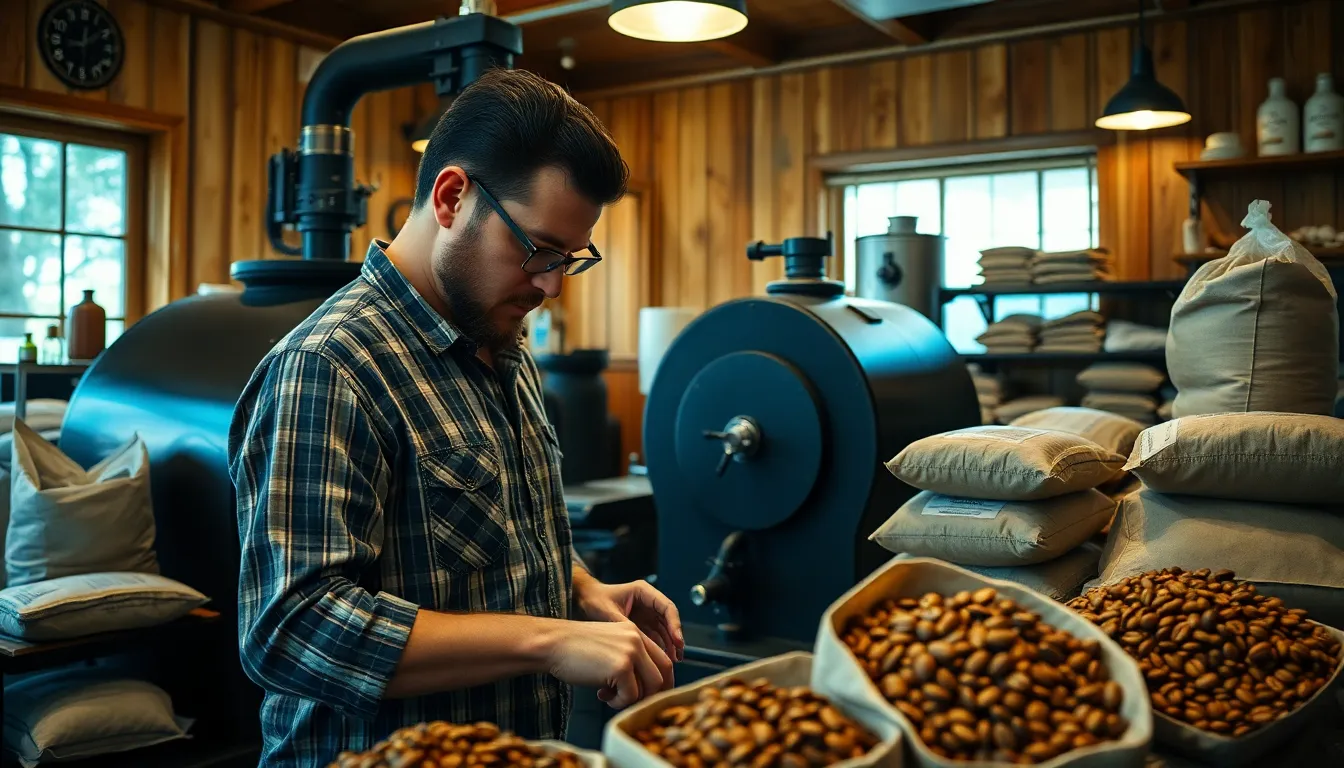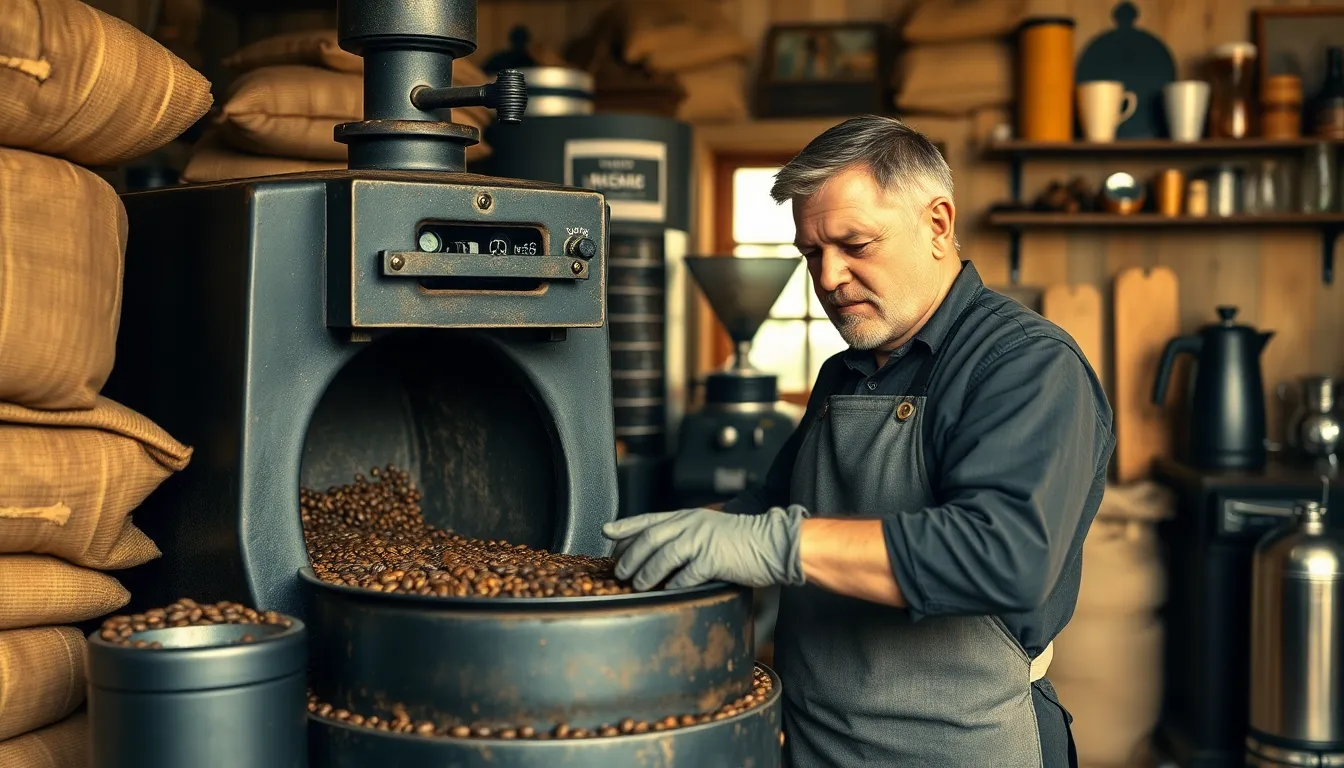In a world where coffee is often mass-produced, artisanal coffee stands out as a celebration of craftsmanship and quality. This unique approach to coffee-making emphasizes small-batch production, sourcing beans from specific regions, and employing traditional brewing methods. For many enthusiasts, artisanal coffee isn’t just a beverage; it’s an experience that connects them to the origins of their drink.
From the meticulous selection of beans to the artful brewing techniques, each cup tells a story of dedication and passion. As consumers increasingly seek authentic flavors and sustainable practices, artisanal coffee has carved out a significant niche in the market. This trend not only elevates the coffee-drinking experience but also supports local farmers and promotes environmental stewardship. Discovering the world of artisanal coffee opens up a rich tapestry of flavors, aromas, and traditions waiting to be explored.
Table of Contents
ToggleWhat Is Artisanal Coffee?
Artisanal coffee embodies dedication to craftsmanship and quality, distinguishing itself from mass-produced options. This unique coffee experience connects enthusiasts to its diverse origins.
Definition and Characteristics
Artisanal coffee refers to small-batch coffee made by skilled artisans. These artisans prioritize quality over quantity by sourcing beans from specific regions known for distinct flavor profiles. Characteristics include:
- Single-origin sourcing: Beans come from selected farms or regions, highlighting unique taste attributes.
- Handcrafted brewing: Traditional methods like pour-over and French press enhance flavors and aromas.
- Quality control: Rigorous standards ensure only the best beans make it to the final product.
- Sustainability: Many artisanal coffee producers support ethical farming practices and environmentally conscious methods.
The Craftsmanship Behind It
- Selection of beans: Artisans assess flavor profiles and quality during the bean selection process.
- Roasting techniques: Small-batch roasting allows precise control over temperature and time, enhancing flavor complexity.
- Brewing methods: Various techniques, like siphon brewing and cold brew, maximize the coffee’s flavor potential.
- Community engagement: Many artisans invest in their local communities, creating direct relationships with farmers and fostering sustainable practices.
The Journey of Artisanal Coffee


Artisanal coffee reflects a detailed process that begins with high-quality beans and continues through precise roasting and brewing methods. Each step in this journey plays a crucial role in producing a unique flavor experience.
Sourcing High-Quality Beans
Sourcing high-quality beans involves selecting specific varieties that grow in ideal climates. Artisans prioritize single-origin beans, which come from one geographic location, ensuring distinct flavors. They often visit farms in regions renowned for coffee cultivation, such as Ethiopia, Colombia, and Guatemala. Establishing direct relationships with farmers helps ensure fair trade practices, which contributes to sustainable farming. This connection not only enhances bean quality but also supports local economies and communities.
The Role of Roasting Techniques
Roasting techniques significantly impact the final taste of artisanal coffee. Artisans utilize small-batch roasting to maintain control over the process, allowing for adjustments based on bean characteristics. Various roasting profiles—light, medium, and dark—highlight different flavor notes and aromas. Craft roasters monitor time and temperature closely to achieve precise results. Through these methods, they unlock the beans’ potential, enhancing the overall flavor experience for consumers. This attention to detail exemplifies a commitment to quality that distinguishes artisanal coffee from mass-produced options.
Flavor Profiles of Artisanal Coffee
Artisanal coffee offers a rich tapestry of flavors, showcasing the skill and passion of its creators. Each cup reflects the diverse characteristics derived from unique beans, careful roasting, and precise brewing methods.
Distinct Taste Variations
Distinct taste variations in artisanal coffee arise from numerous factors. Specific origins influence the profiles, with regions like Ethiopia known for their fruity and floral notes, while Colombian beans tend to feature a balanced profile with caramel undertones.
- Ethiopian Coffee: Known for vibrant acidity and berry notes.
- Colombian Coffee: Characterizes smooth, medium body with nutty and caramel flavors.
- Guatemalan Coffee: Offers full-bodied richness with chocolate and spice nuances.
- Sumatran Coffee: Presents earthy, herbal notes with low acidity.
- Costa Rican Coffee: Features bright, citrusy flavors with a clean finish.
Taste variations often result from altitude, environment, and bean processing methods, contributing to the complexity and enjoyment of artisanal coffee.
Understanding Aroma and Acidity
Aroma and acidity play crucial roles in the flavor experience of artisanal coffee.
- Aroma: Artisanal coffee possesses a broad range of aromatic profiles. Each variety offers unique scents, from floral and fruity to chocolate and nutty. For instance, Ethiopian coffees may emit berry-like fragrances, while a Sumatran coffee might present earthy aromas.
- Acidity: Acidity enhances the brightness of the coffee’s flavor. High-quality artisanal coffees exhibit a pleasant acidity, contributing to a balanced profile. Coffees from higher altitudes typically have more pronounced acidity, while low-altitude beans tend to offer smoother, more subdued acidity.
Combined, aroma and acidity elevate the coffee-drinking experience, inviting enthusiasts to explore a wide spectrum of sensory delights.
The Impact of Sustainability
Sustainability plays a critical role in the artisanal coffee movement. It intersects with ethical sourcing practices and environmental considerations, influencing both the quality of the coffee and the well-being of communities involved in its production.
Ethical Sourcing Practices
Artisanal coffee prioritizes direct trade relationships between roasters and farmers. This approach fosters transparency and fairness, allowing farmers to receive fair compensation for their work. Typically, artisans seek out single-origin beans, ensuring that they maintain quality while supporting local economies. Direct sourcing leads to improved farming practices, with artisans encouraging methods that boost crop quality. Producers who embrace organic or sustainable farming techniques benefit from these relationships, as artisanal roasters often promote their practices to consumers, creating a demand for ethically sourced coffee.
Environmental Considerations
Sustainable practices in artisanal coffee involve minimizing environmental impact throughout the production process. Many artisans adopt eco-friendly farming techniques that prioritize biodiversity and soil health. These practices include crop rotation, organic fertilizers, and water conservation strategies. By focusing on sustainability, artisans reduce carbon footprints and promote healthier ecosystems. Additionally, many coffee roasters implement energy-efficient processes in their facilities, using renewable energy sources or optimizing roasting techniques to reduce emissions. Overall, environmental considerations in artisanal coffee enhance not only the quality of the final product but also contribute to a more sustainable planet.








